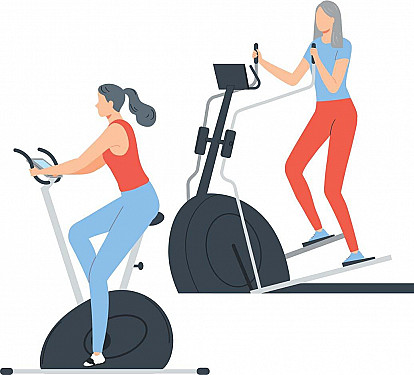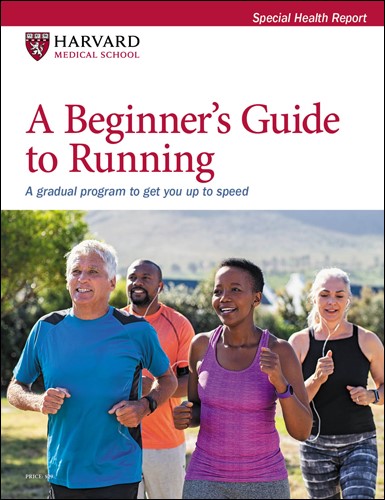Reaping the rewards of running
This high-intensity exercise boosts your cardiovascular fitness and health faster and better than walking. But beginners should make sure to run safely.
- Reviewed by Christopher P. Cannon, MD, Editor in Chief, Harvard Heart Letter; Editorial Advisory Board Member, Harvard Health Publishing

About 50 million Americans say they participate in some form of running or jogging, which means it ranks among the most popular forms of exercise. But while running has many health benefits (especially for your heart), it's a high-impact activity that carries a higher risk of injury than walking and other low-impact exercise.
That's especially true for middle-aged and older people, who also have a higher baseline risk for heart disease than their younger counterparts, says Dr. Neal Lakdawala, a cardiologist at Harvard-affiliated Brigham and Women's Hospital who will be running his 12th marathon this spring.
"There's a low frequency of adverse heart-related events in runners, and over all, the health benefits of running outweigh the risks," he says. But people who have heart disease (or several risk factors for it, such as high blood pressure and high cholesterol) and who are mostly sedentary should check with their primary care doctor or cardiologist before embarking on a running regimen, he says. A helpful resource for gauging your ability is the Get Active Questionnaire, a tool developed by the Canadian Society for Exercise Physiology.
Avoiding injuries
You need to run consistently to reap the cardiovascular rewards, which include reduced blood pressure, lower cholesterol, improvements in sleep and mood, and weight loss. But injuries—which are fairly common in both casual and more serious runners — can derail your motivation and progress. So-called overuse injuries often seen in runners include shin splints, plantar fasciitis, tendinitis, and stress fractures.
For beginners, running too much, too soon, and too fast raises the risk of an injury. Starting slow and alternating walking and running makes good sense (see "A beginner's guide to running"). Dr. Lakdawala also offers these suggestions:
Do strength training. Muscle-building exercises, especially those that strengthen all the different muscles in your legs and core, help protect against injuries by stabilizing and strengthening your bones and joints, which take a pounding when you run.
Increase your mileage gradually. A common rule of thumb is not to increase your running distance by more than 10% per week, although there isn't much evidence to support this advice. But a slow, steady increase in mileage gives your body time to adapt.
Don't keep running with minor injuries. If any part of your feet, legs, or back starts hurting during or after a run, stop and rest that part for a few days.
Consult a physical therapist if your injury doesn't get better. Physical therapists specialize in treating injuries that affect muscles, joints, or nerves. They can help you formulate a safe exercise plan (often featuring strength and dynamic stretching exercises) based on your specific injury and teach you how to perform the exercises correctly.
A beginner's guide to runningA run/walk program is an easy way to ease yourself into a running routine. After a five-minute walking warm-up, follow this schedule:
Stick with a variation of this pattern, adjusting your running and walking times to fit your goals. That might be focusing on consistency — or pushing yourself to run longer and faster. |
Why running?
If you run just 15 minutes a day, five days a week, you'll meet the recommended physical activity guidelines, which call for 75 minutes of vigorous-intensity exercise weekly. But saving time isn't the main reason many runners love the sport, says Dr. Lakdawala. He enjoys the time spent outdoors and camaraderie with members of his running club; the improvement in his cholesterol profile has been an added bonus. Many runners also appreciate the challenge of participating in a race, whether that's a 5K or much longer. "When I signed up to run the Boston Marathon, I had a time goal in mind. But whatever happens, the real joy for me is the journey in getting there," says Dr. Lakdawala.
Image: © Rawpixel/Getty Images
About the Author

Julie Corliss, Executive Editor, Harvard Heart Letter
About the Reviewer

Christopher P. Cannon, MD, Editor in Chief, Harvard Heart Letter; Editorial Advisory Board Member, Harvard Health Publishing
Disclaimer:
As a service to our readers, Harvard Health Publishing provides access to our library of archived content. Please note the date of last review or update on all articles.
No content on this site, regardless of date, should ever be used as a substitute for direct medical advice from your doctor or other qualified clinician.
















